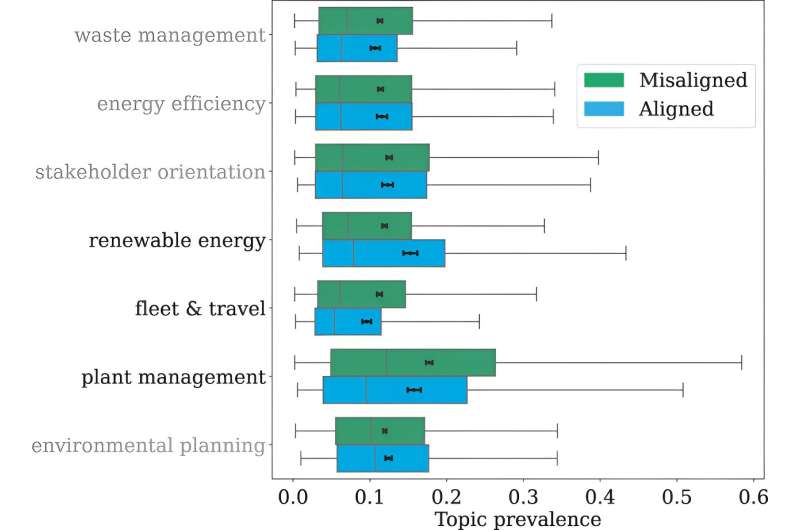This article has been reviewed according to Science X's editorial process and policies. Editors have highlighted the following attributes while ensuring the content's credibility:
fact-checked
peer-reviewed publication
trusted source
proofread
Companies are missing their climate goals with misaligned behavior, says study

The emissions pathways of most companies in high-emitting sectors are not aligned with the climate targets of the Paris Agreement. To better contribute to national and global sustainability efforts, corporate behavior must change. This is the main message of a new study by Imperial College Business School published in Nature Communications.
The study aims to better understand what differentiates companies that can reduce their emissions to levels compatible with the targets of the Paris Agreement from those that do not. It provides an extensive analysis of companies' sustainability behavior and offers insights into the origins of their failure to meet their climate change goals.
To abide by the Paris Agreement, countries have put forward emissions targets and national plans, but meeting these goals depends on the actions of corporations which are responsible for a significant component of global greenhouse gas emissions.
Understanding corporate climate actions and behavior, is therefore crucial, according to Dr. Simone Cenci, an Advanced Research Fellow at the Leonardo Center on Business for Society at Imperial College Business School and one of the authors of the study.
"Currently, we don't really know in enough detail what large publicly traded companies are doing to lower their emissions because there aren't clear reporting standards on the disclosure of sustainability activities. So far we have not been able to identify effective behaviors and companies that are taking the right actions," says Dr. Cenci.
A unique digital database
The team, together with the GOLDEN foundation, used a database composed of more than 800,000 sustainability initiatives extracted from more than 40,000 corporate sustainability reports published by more than 9,000 companies to carry out their analysis. The database includes major global publicly traded companies across all sectors, spanning the last 20 years.
The GOLDEN dataset allowed the team to analyze the activities companies implemented—such as investment in R&D, or modification of assets and procedures, and the objectives of those activities—such as reducing emissions or improving efficiency of production processes.
By focusing on a subset of 1,900 companies in high-emitting sectors (Energy, Industrial, Material, Utilities), the team investigated what differentiates those companies that have been able to reduce their emissions to a level compatible with the climate targets of the Paris Agreement, from those that have not. Their results revealed that the differentiation lies in corporate sustainability behavior.
Companies with emission pathways aligned with the targets of the Paris Agreement focused more effort on developing innovative solutions to meet their energy goals and the investment in renewable resources, as opposed to managing existing assets.
In contrast, the focus of misaligned companies lies more heavily in risk-mitigating activities, such as the modification of existing assets and procedures.
Aligning actions and behavior
These findings, Dr. Cenci says, are of vital importance for industry, government and wider society, by highlighting that companies need to strategically choose their investments when planning their actions around climate change.
To address these concerns, the team has developed a framework to track the effectiveness of companies' climate actions and behavior providing greater transparency across sectors and countries.
"Beyond reporting standards and the introduction of mandatory compliance on impacts, our findings point to corporate behavior that generates the desired impacts, aligned with Paris Agreement targets. We know what Sustainable Development Goals and type of activities companies over-invest and under-invest in. This is critical to adjusting climate strategies for companies, investors and policy-makers," says Professor Maurizio Zollo, a co-author on the paper and Scientific Director of the Leonardo Center on Business for Society.
More information: Simone Cenci et al, The alignment of companies' sustainability behavior and emissions with global climate targets, Nature Communications (2023). DOI: 10.1038/s41467-023-43116-2
Journal information: Nature Communications
Provided by Imperial College London




















